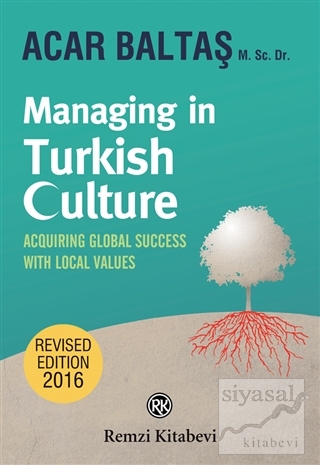Managing in Turkish Culture Acquiring Global Success With Local Values

In Western languages, there are no exact equivalents for the concepts “vefa”, “hatır” and “gönül”. Although “fidelity”, “sake” and “heart” are respectively used to represent them in English, these words are not thoroughly able to express the cultural meanings attributed in Turkish. That is because these concepts do not exist in the cultures from which Western languages originate. Conversely, there are no equivalents for the Western concepts of “vision”, “mission”, “strategy” and “plan” in Turkish. In our tradition, “Once the caravan gets going, the steam will surely follow.”
The linguistic psychology reflecting the manner of thought in a culture sets forth the reasons for the existence ornon-existence of such concepts and their projections in contemporary life. Just as linguistic psychology, this book studies how Turkish business life is influenced by its own cultural values and aims to show how a leader who takes local values into consideration, can be successful both in his/her country and on an international scale.
Contrary to common practice, success in professional life is not achieved by adopting imported processes and criteria. It is achieved by adapting them to the local cultural style and structure; only then can they truly give good results.
Sağ Kulak
Acar Baltaş, M. Sc. Dr. is a pioneer who has demonstrated to a large audience in Turkey that psychology provides solutions for human needs and problems in business life. Since 1983, he has been writing books, giving seminars and doing administrative work for enhancing personal life quality and institutional productivity.
Acar Baltaş has been instrumental in the international success of numerous organizations with his training programmes based on Turkish culture's value system, and team work.
In Western languages, there are no exact equivalents for the concepts “vefa”, “hatır” and “gönül”. Although “fidelity”, “sake” and “heart” are respectively used to represent them in English, these words are not thoroughly able to express the cultural meanings attributed in Turkish. That is because these concepts do not exist in the cultures from which Western languages originate. Conversely, there are no equivalents for the Western concepts of “vision”, “mission”, “strategy” and “plan” in Turkish. In our tradition, “Once the caravan gets going, the steam will surely follow.”
The linguistic psychology reflecting the manner of thought in a culture sets forth the reasons for the existence ornon-existence of such concepts and their projections in contemporary life. Just as linguistic psychology, this book studies how Turkish business life is influenced by its own cultural values and aims to show how a leader who takes local values into consideration, can be successful both in his/her country and on an international scale.
Contrary to common practice, success in professional life is not achieved by adopting imported processes and criteria. It is achieved by adapting them to the local cultural style and structure; only then can they truly give good results.
Sağ Kulak
Acar Baltaş, M. Sc. Dr. is a pioneer who has demonstrated to a large audience in Turkey that psychology provides solutions for human needs and problems in business life. Since 1983, he has been writing books, giving seminars and doing administrative work for enhancing personal life quality and institutional productivity.
Acar Baltaş has been instrumental in the international success of numerous organizations with his training programmes based on Turkish culture's value system, and team work.























